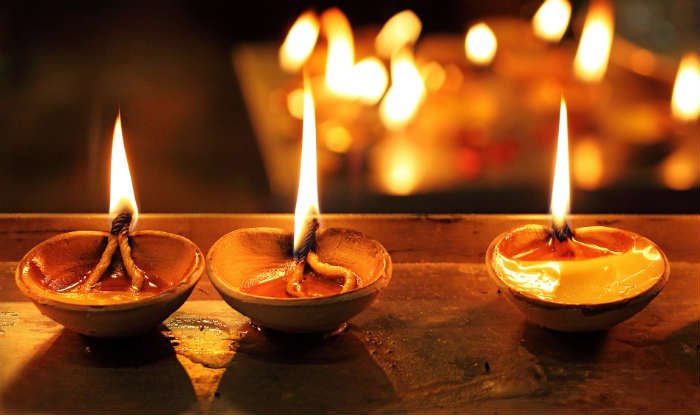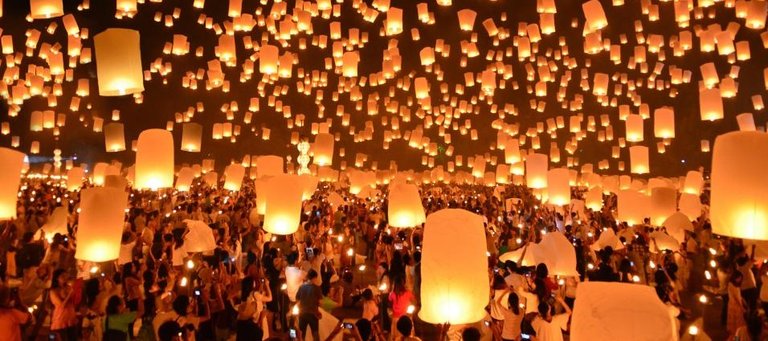
Diwali or Deepawali, is India's biggest and and the brightest and the most important festival of the year. The festival gets its name from "deep" means "light" and "avali" means "a row of lights" . It is the festival of lights. Diwali is marked by five days of celebration, which illuminates the country with its brilliance and dazzles all with its joy. All Indians light outside their homes to symbolize the inner light that protects from spiritual darkness. This festival is as important to Hindus as the Christmas holiday is to Christians.
THE FIVE DAYS OF DIWALI

Day 1: People consider it auspicious to spring clean the home and shop for gold or kitchen utensils.
Day 2: People decorate their homes with clay lamps and create design patterns called rangoli on the floor using colored powders or sand.
Day 3: The third day is the main day of the festival when families gather together for Lakshmi puja, a prayer to Goddess Lakshmi followed by mouth-watering feasts and firework festivities.
Day 4: The fourth day is the first day of the new year when friends and relatives visit with gifts and best wishes for the season.
Day 5: On the last day of Diwali, brothers visit their married sisters who welcome them with love and a lavish meal.
HISTORY OF DIWALI

Diwali dates back to ancient times in India, as a festival after the summer harvest in the Hindu calendar month of Kartika. The festival is mentioned in Sanskrit texts such as the Padma Purana, the Skanda Purana both completed in second half of 1st millennium AD but believed to have been expanded from a core text from an earlier era. The diyas (lamps) are mentioned in Skanda Purana to symbolically represent parts of the sun, the cosmic giver of light and energy to all life, who seasonally transitions in the Hindu calendar month of Kartik.
Hindus in some regions of India associate Diwali with the legend of Yama and Nachiketa on Kartika amavasya (Diwali night). The Nachiketa story about right versus wrong, true wealth versus transient wealth, knowledge versus ignorance is recorded in Katha Upanishad composed in 1st millennium BC.
King Harsha in the 7th century Sanskrit play Nagananda mentions Deepavali as Deepapratipadutsava (Deepa = light, pratipada = first day, utsava = festival), where lamps were lit and newly engaged brides and grooms were given gifts. Rajasekhara referred to Deepavali as Dipamalika in his 9th century Kavyamimamsa, wherein he mentions the tradition of homes being whitewashed and oil lamps decorating homes, streets and markets in the night. The Persian traveller and historian Al Biruni, in his 11th century memoir on India, wrote of Deepavali being celebrated by Hindus on New Moon day of the month of Kartika.
.
.

Hi! I am a robot. I just upvoted you! I found similar content that readers might be interested in:
https://en.wikipedia.org/wiki/Diwali
Diwali is the favorite festival of all Indians without a doubt. Nice post by the way @steemindia
yes, thank you for commenting @steemafia
Congratulations @steemindia! You have completed some achievement on Steemit and have been rewarded with new badge(s) :
Click on any badge to view your own Board of Honor on SteemitBoard.
For more information about SteemitBoard, click here
If you no longer want to receive notifications, reply to this comment with the word
STOPCongratulations @steemindia! You have received a personal award!
Click on the badge to view your Board of Honor.
Do not miss the last post from @steemitboard:
Congratulations @steemindia! You received a personal award!
You can view your badges on your Steem Board and compare to others on the Steem Ranking
Do not miss the last post from @steemitboard:
Vote for @Steemitboard as a witness to get one more award and increased upvotes!